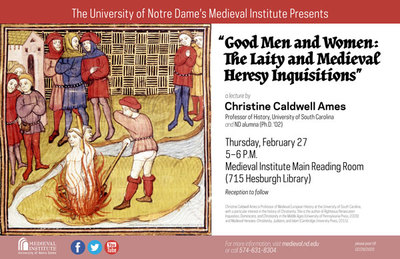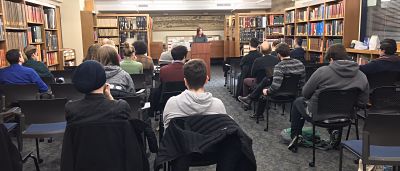ND Alumna Christine Caldwell Ames Delivers Lecture on the Role of Laity in Medieval Inquisitions
On Thursday, February 27, the Medieval Institute hosted Christine Caldwell Ames, Professor of Medieval European History at the University of South Carolina, to deliver a talk entitled “Good Men and Women: The Laity and Medieval Heresy Inquisitions” to a full house. For many at the Medieval Institute, the lecture had added significance, as Caldwell Ames is an alumna of the university.

A dynamic scholar whose work touches on religious persecution and medieval heresies in Christianity, Judaism, and Islam, Caldwell Ames was able to bring together her broad expertise in a lecture that was accessible yet challenging and that pushed back on commonly held beliefs about medieval inquisitions.
In her lecture, Caldwell Ames nuanced the oft-held dichotomy that casts the image of the diabolical inquisitor, fiercely chasing his unchecked whims against suspected heretics, alongside lay resistance to ecclesiastical efforts against heresy, whether through violence, deception, or silence.
Instead, as Caldwell Ames demonstrated, many lay men and women in medieval Europe participated in, or actively supported, the fight against heresy. "Ames' talk," notes Will Beattie, Medieval Institute Ph.D. student, "was an engaging and nuanced look at the role of the Inquisition as an institution comprised of thinking, feeling individuals who exercised autonomy even as they operated under the Church's decrees. "
Among the examples from which Caldwell Ames drew were members of the laity who played various roles in the religious persecution of their neighbors, ranging from waging war to advising on inquisitorial procedure to serving as jailers. Such cooperation is largely overlooked in scholarship in favor of a binary opposition of inquisitors versus communities.
Yet, Caldwell Ames argued, attention to these lay roles contributes to a more nuanced understanding of the mechanics of oppression in medieval Europe and its religious foundations. It also poses the challenging question of how historians evaluate guilt and responsibility for persecution in the past.

Professor Caldwell Ames followed her lecture with a graduate seminar the next day.
Christine Caldwell Ames is Professor of Medieval European History at the University of South Carolina, with a particular interest in the history of Christianity. She is the author of Righteous Persecution: Inquisition, Dominicans, and Christianity in the Middle Ages (University of Pennsylvania Press, 2009) and Medieval Heresies: Christianity, Judaism, and Islam (Cambridge University Press, 2015). She has published several articles and book chapters on heresy, inquisition, and meanings of “religion” both in the Middle Ages and in modern scholarship, including “Does Inquisition Belong to Religious History?” in The American Historical Review (2005). Her work has received support from the NEH, the Mellon Foundation, and the Fulbright Program. She is also a Ph.D. graduate of the Department of History at the University of Notre Dame.